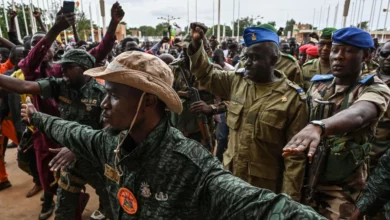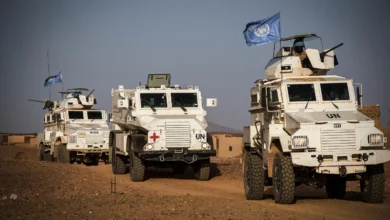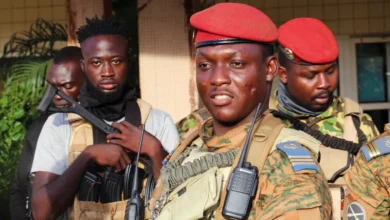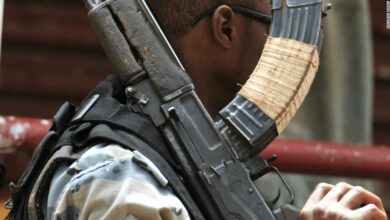
Tuareg rebels closed in on a key city in northern Mali Sunday, taking advantage of a power vacuum in Bamako where putschists insisted they were in firm control after ousting the government.
As the junta condemned widespread looting in the capital and struggled to restore order, soldiers in the distant north recruited militia to help them fight Tuareg rebels waging a battle for independence.
Tuareg rebel group Ansar Dine (Defenders of Faith) said its fighters had surrounded one of the north's main towns where, they said, they would apply Sharia.
"Thanks to God the almighty and his blessings, we will soon take our land in Kidal," said a statement from the group.
Ansar Dine is an Islamist group fighting alongside the Azawad National Liberation Movement for the independence of the homeland of the nomadic desert Tuareg in the country's northern triangle.
Down in the south, in the capital Bamako, mutinous soldiers seized power on Thursday, fed up with the government's failure to equip them properly to fight the Tuareg insurrection.
The Tuareg, light-skinned desert tribes that populate the north of Mali, are a minority in the vast country. Reacting to what they say is neglect from Bamako, they have staged several uprisings in recent decades.
On 17 January, they launched their first rebellion since 2009, boosted by the return of heavily armed, battle-hardened fighters from Libya, who formerly served late leader Muammar Qadhafi.
Their forces have already taken several towns and scores of soldiers are said to have been killed and captured.
Angry soldiers revolted in Bamako Wednesday, leading to a full-blown coup by early Thursday as they seized government buildings and forced President Amadou Toumani Toure to flee.
Soldiers left facing the Tuareg are being supported by two notorious militia groups from black communities, mostly Fulani and Songhai, who were involved in earlier Tuareg uprisings.
"We are about 200 youths, the Malian army gave us weapons today and uniforms to fight the country's enemies. We are already in the Gao military camp," said one of these militia, Mahamane Maiga. A Malian officer confirmed the information.
In Bamako, a junta frozen out by the international community was at pains to assure citizens it was firmly in power, making regular appearances on state television.
"I am Captain Sanogo and I am in good health, all is well," the coup leader said in a segment broadcast on Saturday, after rumors of his death circulated the evening before.
Insisting he had the backing of all of the armed forces, he asked the camera to pan over representatives of the police, paratroopers, air force and paramilitary police. All were low-ranking officers.
Sanogo met French ambassador Christian Rouyer and other dignitaries, Saturday, the state television channel reported.
The coup leaders also issued a statement calling on soldiers to return to barracks and reminding unit commanders they were responsible for their men.
With petrol running short, soldiers urged station owners to open up for business.
But sporadic looting continued, sparking anger and fear in the capital.
The national human rights commission denounced the "climate of terror" caused by continuing sporadic gunfire.
"The junta looks increasingly isolated and rudderless," said analyst Paul Melly, of the London-based Chatham house, in Dakar.
"They don't seem to have expected the rebuff they have encountered from the political class, where all the main parties have united in condemning the coup."
The coup was met by swift international condemnation. The African Union temporarily suspended Mali, Europe and Canada froze aid and the US has threatened to follow suit.
A joint mission from the African Union and Economic Community of West African States met representatives of the junta on Friday, according to Malian state television, without giving further details.
Early Saturday, a group of soldiers briefly arrested an opposition politician who had spoken out against the coup. Several other politicians told AFP they had gone underground, fearing they would be next.
A presidential election in which President Toure was to step down after two terms had been scheduled for 29 April.
In a phone call with Senegalese President Abdoulaye Wade, Sanogo said Toure and his family were safe, according to a statement from Senegal.




